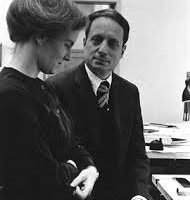Choosing One’s Foremothers: The Tikva Frymer-Kensky Chair
When the University of Michigan, in June 2013, appointed Anita Norich, acclaimed scholar of American Yiddish literature, to a Collegiate Chair — an appointment that brings with it the opportunity to select the chair’s name — she chose to name it for the pioneering feminist scholar of biblical literature, Tikva Frymer-Kensky (1943–2006).
Frymer-Kensky’s intellectual odyssey reflected some of the trials of the first generation of academic feminists. Her Ph.D. from Yale University in Assyriology and her lifelong commitment to feminism spurred her to employ her enormous knowledge of ancient texts, religions and languages
toward further understanding in the modern world and fueled her passionate explication of the Bible.
When Norich arrived in Ann Arbor 30 years ago, she met Frymer-Kensky. Norich recalled that, “In addition to being a much-admired scholar, with a prodigious intellect and fierce commitment to Judaism and to feminism — all things that are of obvious importance to me — Tikva was one of the first people to make me feel welcome in Ann Arbor. She and her husband, Alan Kensky — who was the rabbi at Beth Israel in those years — were the models of Jewish and scholarly dedication I strive to emulate.” Norich recognized that “Tikva followed a career path that was not typical (except in the case of many women) in a field dominated by men. It almost sounds like a cliché these days to say that she found a way to balance family life and scholarship, but she did it in ways that were not at all a cliché. As her family grew (with two children who are now Jewish Studies scholars), so did her scholarly work. She was never a mother and wife by day and a scholar by night, but always entirely inhabited all of these identities at once.” For Norich, just starting out as an assistant professor, Frymer-Kensky’s dedication inspired her. “Out of the academy for many years, she continued to pursue — and excel in — her academic work.”
Frymer-Kensky solidified her reputation after she left Ann Arbor with her family for an appointment at the Reconstructionist Rabbinical College in Philadelphia, and then, in 1995, took a position at the University of Chicago Divinity School. Her groundbreaking 1992 book, In the Wake of the Goddesses: Women, Culture and the Biblical Transformation of Pagan Myth, asks big questions, tackling such issues as what does it mean to have a gender, religiously speaking? Norich observes that “The title of her first (of several) books should be the title of everything written about her: “In the Wake of the Goddesses.”
Once she found her remarkable voice, Frymer-Kensky’s extraordinary intellect was unstoppable. In 1995, she boldly published a very different kind of book that spoke directly to contemporaries: Motherprayer: The Pregnant Woman’s Spiritual Companion. Her next book, Reading Women of the Bible (2002), bridged significant divides between academic and lay audiences. It swept all of the major Jewish awards and generated widespread excitement over a new vision and understanding of biblical women.
Frymer-Kensky opened doors for other feminist scholars to enter. She was the model of a bold intellect, a caring mother and partner, a profound scholar of the
religions of antiquity and a committed
Jewish woman.
What’s in a name? Perhaps more than we realize. In choosing to occupy the Tikva Frymer-Kensky Chair at the University of Michigan, Anita Norich celebrates and contributes to an important intellectual feminist heritage.




